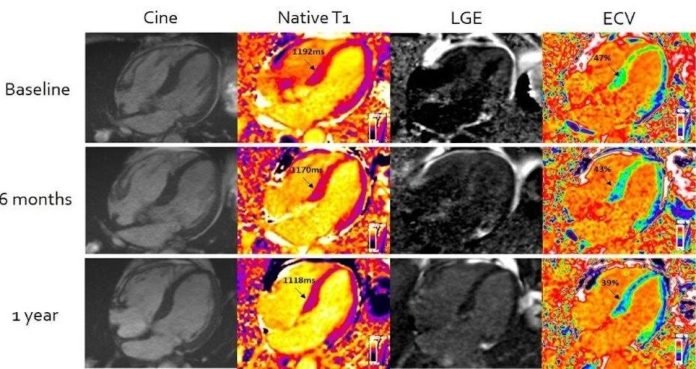
In a study from University College London, scientists show that an advanced form of cardiac MRI has for the first-time enabled clinicians to measure the effectiveness of chemotherapy in patients with the life-limiting condition ‘stiff heart syndrome’.
Researchers say the breakthrough means doctors will now be able to better guide treatment strategies and, by doing so, improve patients’ prognosis.
Light-chain cardiac amyloidosis (stiff heart syndrome) occurs when plaques of a protein called amyloid build up in the heart muscle, affecting its ability to pump blood, and without treatment can rapidly lead to heart failure and death.
However, assessing the condition has been difficult, as while clinicians can detect the presence of amyloid in the heart, there has been no safe test to measure the amount.
In the current study, the team developed and refined Cardiovascular Magnetic Resonance (CMR) Extracellular Volume Mapping (ECV) for amyloid.
This non-invasive technique enables clinicians to measure both the presence and amount of amyloid protein using MRI.
Now for the first time, they have used the technology to evaluate the success of chemotherapy treatment, by assessing cardiac amyloid regression or progression.
They tested 176 people with light-chain cardiac amyloidosis.
The advanced MRI technique allowed researchers to accurately measure the amount of amyloid protein in hearts, and, for the first time ever, to measure the changes in response to chemotherapy on repeat scans.
By measuring the changes they could detect which patients would have a better or worse prognosis.
Further, combining the results with blood tests for the disease, it was found almost 40% of patients had a substantial improvement (reduction) in amyloid deposition, something that was not thought to be possible before—showing how effective chemotherapy can be.
The team says the scans and data made available using this technique, giving them the information to both see the amount of amyloid protein and also the regression in amyloid during the course of chemotherapy treatment.
This is incredibly valuable for clinicians; knowing the amount, rather than just the presence of amyloid, means they can better guide treatment options, by more accurately deciding the timing and protocol of second-line chemotherapy treatments.
If you care about heart health, please read studies about how eating eggs can help reduce heart disease risk, and Vitamin C is linked to a lower risk of heart failure.
For more information about heart health, please see recent studies about high blood pressure drugs that may increase heart failure risk, and results showing common snacks may lead to high blood pressure and heart rhythm disorder.
The study was conducted by Dr. Ana Martinez-Naharro et al and published in the European Heart Journal.
Copyright © 2022 Knowridge Science Report. All rights reserved.



